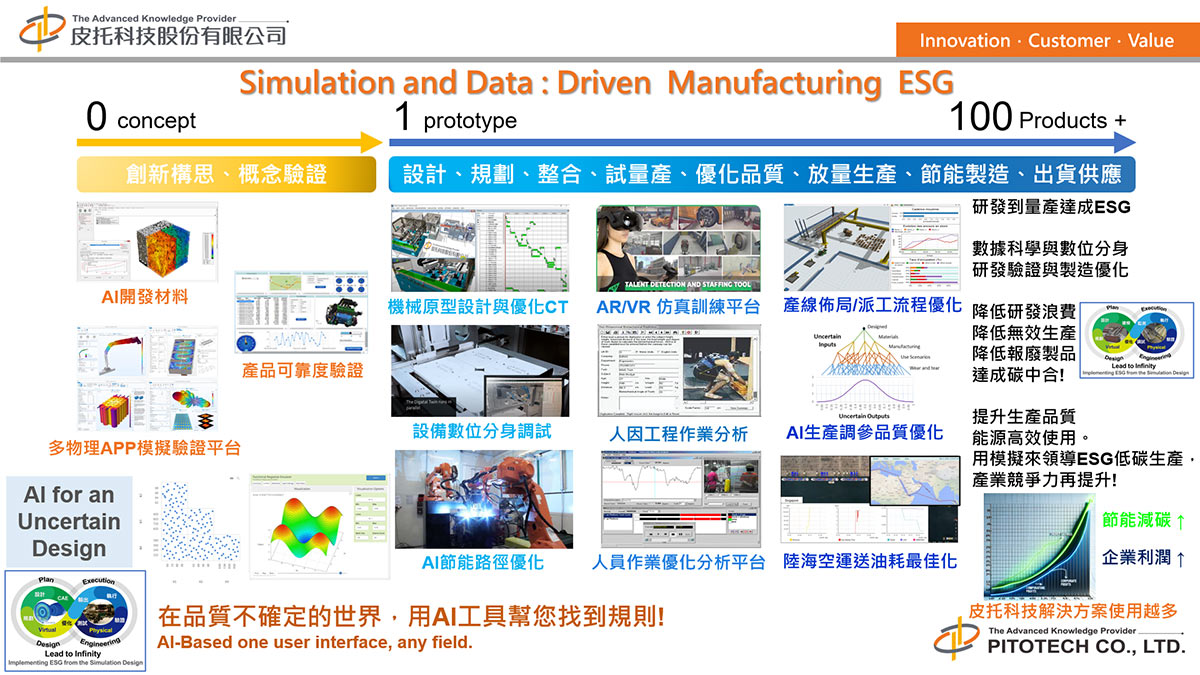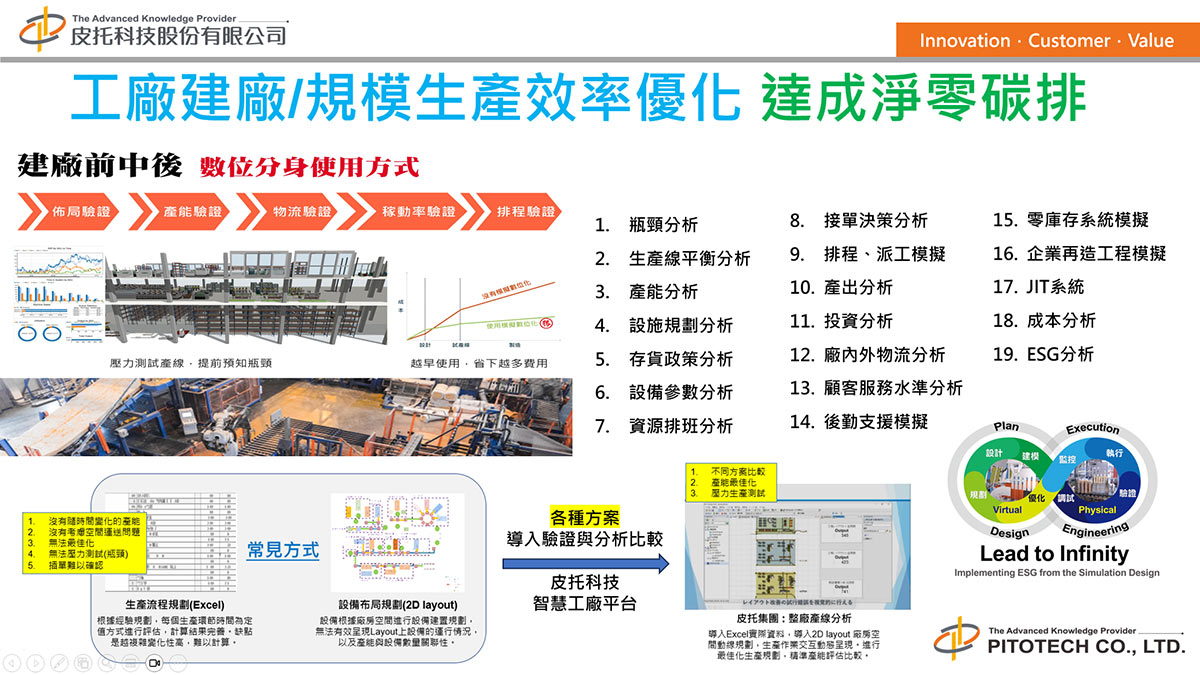


Since the Sino-US trade and technology war in 2018 prompted the restructuring of global supply chains with the "China+1" strategy, Taiwanese businesses have been driven to return to Taiwan or diversify risks by relocating to Southeast Asia. Subsequently, the COVID-19 pandemic further accelerated the pace of digital transformation by hindering cross-border business activities. Pitotech, with over 30 years of accumulated knowledge and experience, acts as a consultant, assisting various industries, from large to small, in fully utilizing digital twin technology for transformation, rapid global deployment, and achieving ESG sustainable manufacturing.
As the global manufacturing industry continues its journey towards Industry 4.0, integrating Cyber-Physical Systems (CPS), human-machine collaboration, and generative AI requires access to more comprehensive and massive amounts of data. Pitotech has gradually transformed from a software vendor of digital factory simulation systems into a professional knowledge service provider (The Advanced Knowledge Provider), creating greater value for its clients.
Through the company's simulation and consulting services, it provides comprehensive practical solutions for R&D design, manufacturing, planning, and quality control, covering customized needs such as CAE finite element analysis, virtual-real integration of automated equipment, production capacity strategy simulation, and quality control big data analysis, meeting the objectives of different industry clients. During the transition from manual operations to automation and the connection to Industry 4.0, unnecessary cost waste is reduced. Even with future global deployments, digital twins can be created to align with corporate culture, producing highly competitive, high-quality products with high yields.
Mr. Jiaming Chen, Director of Software Systems at Pitotech, stated that, for example, many semiconductor companies currently setting up factories in Malaysia, starting with material selection, spend 3-12 months trying to improve the yield of various products but often fail to identify the root cause. At this point, Pitotech can leverage its industry database, built on over 30 years of knowledge and experience, to help industries quickly pinpoint problems. It can even provide integrated applications with NVIDIA's Omniverse platform, avoiding time wasted on trial and error. "In a world of uncertain quality, use AI tools to help find the rules!"
This further accelerates the realization of innovative ideas and proof of concepts during the development process. After product and automated equipment design, planning, and integration, the process continues through trial production, quality optimization verification and tuning, and then mass production, incorporating energy-saving manufacturing considerations until the actual shipment and market launch of products.
Chen pointed out that as various countries are currently promoting the 2050 net-zero carbon emission target, including international high-tech giants such as Apple and TSMC, they are prioritizing cooperation with Pitotech and including it in their supply chains to meet brand buyers' ESG sustainable manufacturing requirements for the entire product lifecycle, from design to mass production.
Pitotech can not only monitor real-time energy consumption and bottleneck stations in the manufacturing process but also reduce time, labor, and material costs spent on trial and error during the design phase. It assists in planning the introduction of suitable automated equipment brands and quantity configurations to improve production accuracy, yield, AGV dispatching, and machine utilization. This enables quick identification of the correct direction, aligning with corporate culture and achieving optimal efficiency and cost-effectiveness, thereby enhancing competitiveness in the international market.
It even integrates TPS and Lean Production, commonly practiced in traditional manufacturing, using simulation to predict feasibility and effectiveness, building employee consensus, reducing time wasted due to expectation gaps, and quickly achieving goals. It also introduces the concept of the industrial metaverse, using cloud platform simulation to train existing employees on the use of new machinery, equipment, and methods, reducing the risk of actual product waste or equipment damage.
This not only allows new employees to quickly get up to speed, shortening the learning curve, but also places experienced employees in the right production positions, focusing on planning, decision-making, and judgment tasks, achieving ESG goals from the source. Tedious, repetitive, and boring tasks are handled by automation, rather than using downtime or production line pauses to save on enterprise contracted power capacity.
Compared to similar software platforms from European and American brands, Pitotech can also act as a consultant, using over 30 years of experience to help clients select the optimal matching software, hardware systems, or platform tools to achieve the required high cost-performance ratio (CP value) or yield, and identify truly potential problems, ultimately meeting expected benefits and making return on investment (ROI) worthwhile.
Especially with the potential for a second global supply chain restructuring, manufacturers cooperating with the southward policy may face local labor shortages and a lack of skilled technicians. At this time, the database provided by Pitotech can be used to properly allocate the proportion of automated equipment and human collaboration, achieving optimal benefits without necessarily purchasing additional equipment, and adjusting optimal production capacity according to the dynamics of the global political and economic situation. Pitotech also emphasizes its ability to support enterprise deployment, providing local, long-term on-site services to find the most suitable local suppliers for production.
